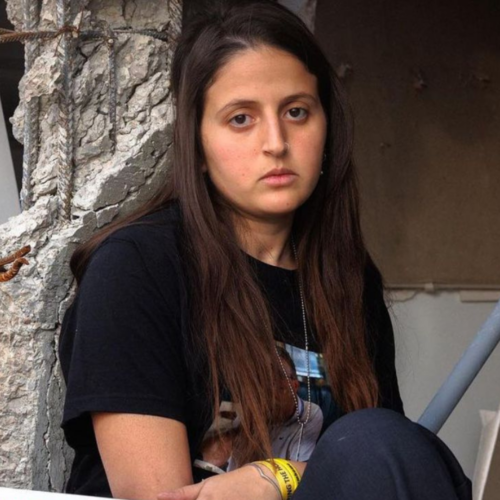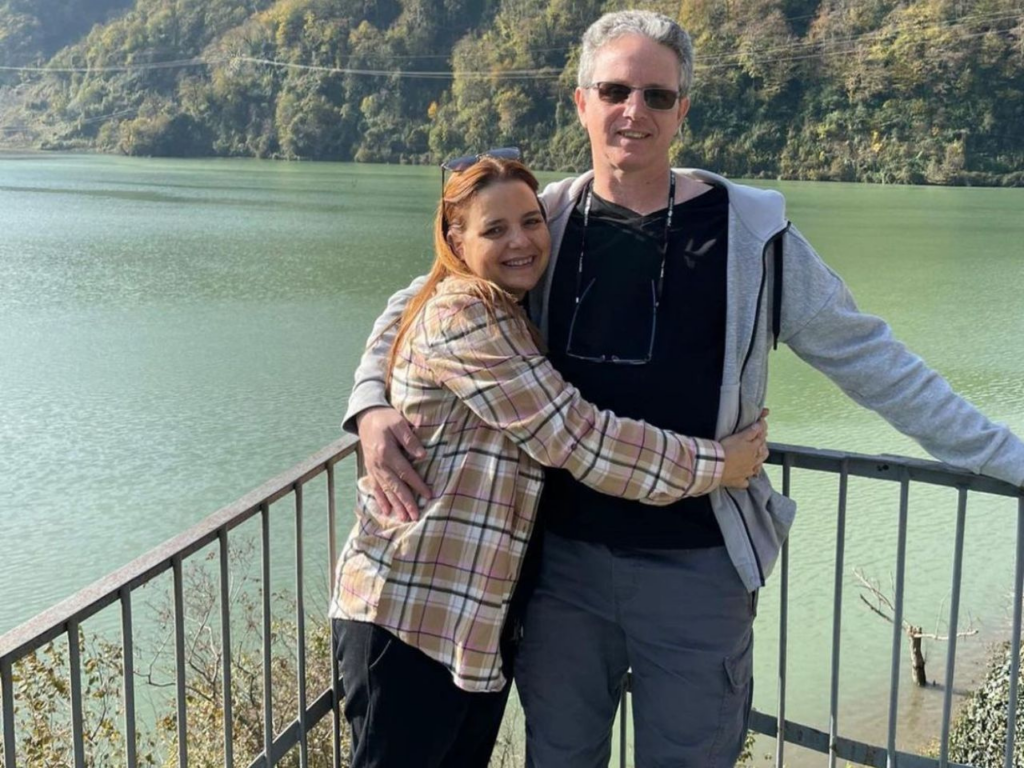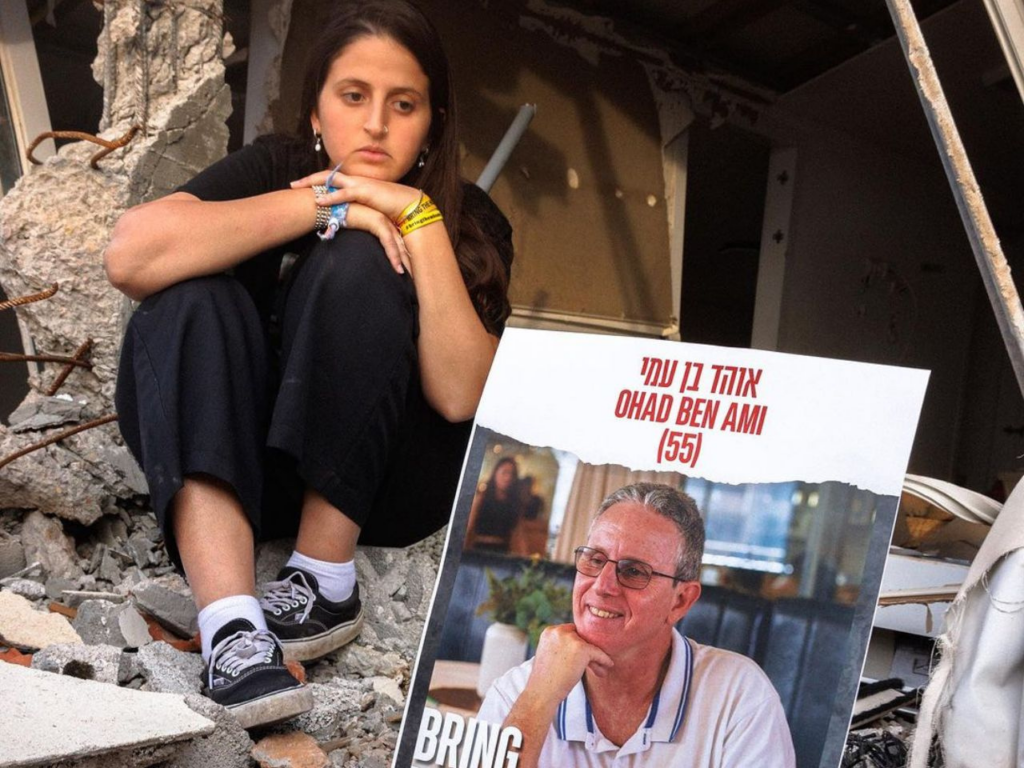162 days and counting: She survived Hamas gunmen on October 7, now pleads for her father’s safe return
At 11:00 a.m. a shocking image appeared on Telegram of terrorists dragging my father from his home, wearing only underwear and a T-shirt. I felt torn between relief and fear.
- 2 years ago
March 16, 2024

BE’ERI, Israel — My life changed forever on October 7, 2023, when Hamas terrorists launched an attack on Israel. It was Shabbat, a day reserved for prayer and rest in Jewish tradition. Instead, that morning left an indelible mark on our memories, transforming a day of peace into a nightmare.
At my apartment in Kibbutz Be’eri, the sound of missiles and sirens shattered the tranquility of the morning. An hour later, my mother sent a terrifying message. Gunshots echoed near her home, in the same kibbutz. The situation quickly escalated, and my boyfriend and I heard instructions from the kibbutz office. They said to take shelter, turn off all the lights, and close our windows. We soon understood Hamas terrorists infiltrated our community.
Around 9:30 a.m., my father sent a message. Terrorists ransacked their home, leaving destruction in their path. My father sent no more messages; it was the last communication I received. An agonizing state of uncertainty consumed me, and amidst the chaos, I clung to hope my parents remained undiscovered in their safe room.
Discover more stories on the Palestine-Israel conflict At Orato World Media.
Walking outside with IDF soldiers, the kibbutz looked like a war zone
Throughout the morning, I repeatedly attempted to contact my parents. I called and texted, but they never answered and eventually, their phone batteries died. I battled a horrifying, reoccurring thought that the Hamas soldiers had trapped them in a fire.
At 11:00 a.m. a shocking image appeared on Telegram of terrorists dragging my father from his home, wearing only underwear and a T-shirt. I felt torn between relief and fear. “My father is alive but what might happen next,” I worried. “And what of my mother?” She did not appear in the photo on Telegram.
Every second we spent in our safe room felt like the brink of death. I doubted we would make it out alive and the uncertainty of my parents’ safety intensified into overwhelming fear. It felt like someone put my life on hold as the looming threat of death cast its shadow. At 11:00 a.m. [nearly five hours since the sounds of missiles shattered the morning peace] Israeli Defense Force officers arrived. They rescued my boyfriend and I from the safe room.
Stepping outside, the extent of the devastation confronted me. The exterior of my peaceful apartment now looked like part of a chaotic war zone. I ventured into the kibbutz and, suddenly, two Hamas terrorists targeted me. The IDF soldiers who accompanied me put me on the ground and covered me with their own bodies until the other soldiers neutralized the threat.
Sitting in a shelter in the aftermath of the Hamas attack in Israel, young woman goes numb, frets over her parents’ whereabouts
As I walked through the kibbutz, the destructive scene overwhelmed me. Homes lay in ruins. The bodies of lifeless dogs sat atop debris, and my dead neighbors dotted the roads. A once pristine community transformed into a haunting landscape, shrouded in smoke and marked by death. Upon reaching my parents’ apartment, I found it destroyed. Though spared from the burning flames that took other homes, the interior was in complete disarray.
The IDF escorted me to a nearby hotel with other survivors seeking refuge. At the time, those five hours in the shelter felt like the worst of my life. Yet, the thought of leaving and confronting reality seemed far worse. Unable to process what just happened, I grappled with a sudden void. Mere hours before sitting in that shelter, I had a loving family, a home, and my parents. The attack thrust me into uncertainty, sitting amongst other rescued Israelis, wondering if this was a nightmare.

Just that morning, I felt my parents’ warm presence in my life and enjoyed a cozy home. By afternoon, I sat alone without them, unsure of their fate. The Telegram clip offered some hope my father might be alive, possibly held captive in Gaza, but my mother’s status remained a mystery. I had no idea if she was dead or alive.
That day, the people shared a collective grief. Overwhelmed with sorrow and anger, I cried uncontrollably for hours. I found solace in my boyfriend’s words, urging me to be strong and fight for my parents’ return. With newfound strength, I committed myself to finding their whereabouts. A few days later, IDF soldiers confirmed that my mother was indeed being held hostage alongside my father. Knowing they were alive became my driving force, fueling my resolve to bring them home.
Daughter figthts every day for her father’s safe return from Gaza to Israel
I will never stop until I have both my parents. Every moment tests my resilience. Fifty-four days after being taken, Hamas released my mother, generating a moment of profound emotions. In the building where I stayed, everyone there heard my shouts when I received the news. When she arrived, however, it broke my heart.
My mother looked frail, having lost weight, and was parched and worn out. I held back my tears to comfort her as best I could, and to honor her resilience. During those agonizing days in captivity, my mother showed immense strength and a will to survive. The pride I feel for her surges within me.
Still, my fight carries on. My father remains in captivity in Gaza. His exact location remains unknown to me and to the IDF. When my mind wanders to the thought of him being denied necessities like warm clothing, it feels unbearable. To stand in solidarity with my father, I forsook wearing warm clothing myself. For 162 days now, Hamas has held my father hostage, and each new day feels more intolerable than the last. The thought of him suffering haunts me every second.
I remain committed to doing everything in my power to bring my father home from Gaza. I want him to know, “You must stay strong and endure.” Every day, I fight for him and refuse to let him be forgotten or forsaken. My father needs to know he is loved, and we await his return. Looking at my mother, I see how her heart aches for him. He must return alive.



































































































































































































































































































































































































































































